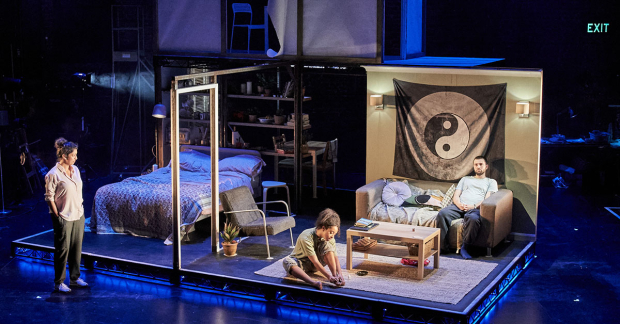
© Manuel Harlan
There isn't a way of doing a very interesting or insightful review of That Is Not Who I Am, a play which relies on its audience not knowing much about it, without spoiling it, so read in awareness of that fact. The most substantial spoilers will be delayed until the end.
This turns out to be a strangely limp offering after the mystery of its rollout by the Royal Court, which disguised its playwright's identity with a pseudonym (Dave Davidson) and some hand-waving copy. This did the work of priming audiences to be ready for an experience concerned with being online, false identities, and losing track of reality, and had the accidental side effect of pissing (theatre) people off by obviously not being the effort of an apparently first-time writer.
The play immediately unwraps itself, however, as the quite true crime investigation of a playwright into the love and suspicious deaths of a couple of conspiracy-prone climate activists, who meet on a Guardian Blind Date and go on to gain both a baby and a YouTube account following before their world starts crumbling during the pandemic. A disclaimer from the Royal Court that they're breaking a Home Secretary embargo and risking bringing the law down on their heads with this subject opens the play.
As the couple themselves, Celeste and Noah Quilter, Siena Kelly and Jake Davies are eminently likeable, twisted around each other affectionately and suffocatingly. Celeste is the more fervent and striking, despite Noah's dedication to his political vlogs and filmmaking depicting the execution of public figures, with live filming (designed by Gino Ricardo Green) and screenshots of Reddit and YouTube projected onto their home. We're with them for every vulnerable moment, though we're told they're composite imaginings, the product of their self-documentation pored over by the playwright to make something with some truth in it.
Priyanga Burford plays an actor who needs to stand in as that playwright, drafted in last minute, script-in-hand (though she doesn't need it). She's a comforting presence throughout, though perhaps a bolder version of this play would've deferred her narrating duties to the actors of the couple, or had fun compromising and complicating her role further.
Out of the couple's increasing distrust of anything besides each other, Celeste's work as an NHS nurse and their political hunger, the play makes references to government abuses of power during the pandemic, attempts to clamp down on protest, and digital surveillance. Though the distance between us and the couple's secrets feels appropriate, and the play becomes more compelling as it becomes more grim, we don't get under the skin of any of this stuff in very interesting ways.
All the way to the back wall of the Royal Court's Downstairs is shown in Naomi Dawson's set, as the incredibly active and visible stage managers (Lizzie Chapman, Jen McTaggart, Elle Hutchinson, and Ophir Westman) manipulate the structure of the Quilters' home. It feels like it offers the increasingly vulnerable bodies of the couple brief moments of being shielded from the audience, and the government monitoring they imagine, as it's turned. Peter Rice's sound design beats tensely, though makes more use of vocal samples of lines only just heard which spell out what the play's getting at than is strictly needed.
There's one beautiful moment in Lucy Morrison's direction, a lynchpin for the couple's story, involving a vase in the shape of a hare and some sort of physical-spiritual revelation, to which Anna Watson's lighting gives a pink-misted horror. There's no speaking in this scene, but it feels convincing and utterly engrossing. Much of the rest of the play feels taken up by the feat of its mismarketing and duty as a documenting exercise, but not in a way which yields anything of destabilising depth or surprise. We aren't really taken anywhere.
The Quilters are not a real couple who lived and died, so nothing was bravely risked or betrayed in putting on this play, which is par for the course, really. But the play itself – actually called Rapture – leaves an even vaguer impression knowing that. By the time the real Lucy Kirkwood, actual writer of the play (to be sometimes played by herself!) charges onstage to accuse Burford's version of Kirkwood of kowtowing to the Royal Court's censorship, it seems grandly silly but in service of very little: hasty, oddly lacking in care.












